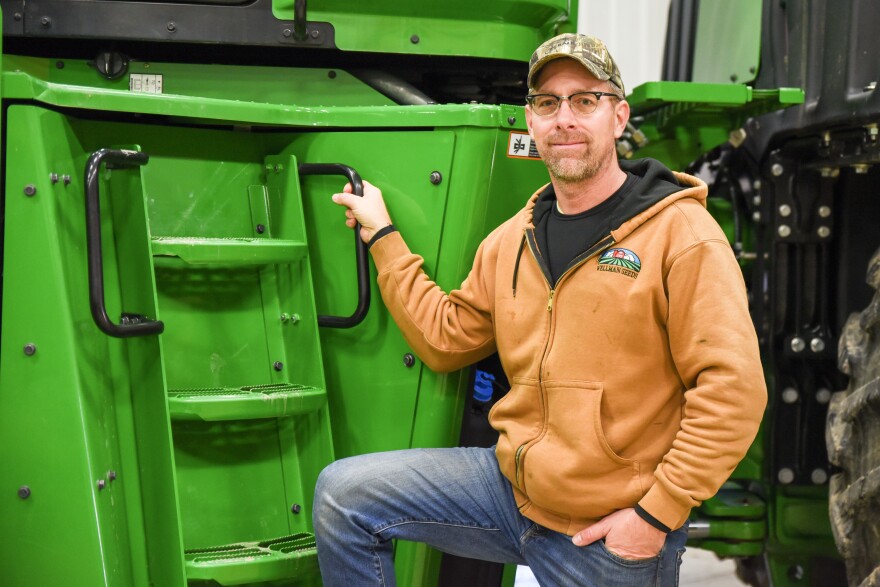At the first of the year, a law in Colorado went into effect that allows farmers to repair their own equipment. Now Michigan is considering a similar proposal.
Modern day tractors and combines are basically like computers on wheels and for years, there’s been a battle between farmers and manufacturers over who should have access to the information needed to repair them. Equipment manufacturers have made some concessions in order to avoid new laws, but some farmers say that’s not enough.
About an hour south of Detroit, near Ida, in Monroe County, Mark Metz and his father farm 1,800 acres of corn, soybeans, and wheat.
Metz said a while back a computer error showed up on the dashboard in his tractor. With no access to information about the tractor software, he had no choice but to ask the dealership to send someone to look at it.
“We deal with a dealer that's a little over an hour away, and they usually do get here pretty quickly. Of course, you're paying for their road time. So, I mean, we pay a good two to two-and-a-half hours of just road time just to get them here,” Metz said.
The dealership’s guy hooked up a diagnostic tool and found it was just a wire that had come unplugged. He plugged it in.
The initial bill for that repair was $800.
Metz said had it been his truck, he could have taken it to a nearby auto parts store.
“Usually for free, you know, they’ll bring out a computer and plug it in. ‘Oh, yeah, yeah, you need this,’ you know, no big deal. Well, for us, there is no option for a third party, let alone ourselves, to plug into the computer system of the tractor and just say, you know, hey, it’s something simple,” Metz explained.
That’s why he submitted testimony to the Michigan House Agriculture Committee, supporting ‘right to repair’ farm equipment legislation.

Democratic Representative Reggie Miller chairs that committee and introduced the bill. She said waiting on a dealership to show up can be costly for farmers.
“When they're out in the field, when they're in that combine and it breaks down and they have a short window to get that crop out, it can be devastating. It could cost them tens of thousands of dollars,” Miller said.
There is a national ‘right to repair’ movement. Several states have passed laws requiring service information about some products.
Despite the growing movement, there’s still opposition.
Dave Worthams is with the Michigan Manufacturers Association. He said the groups pushing for the legislation don’t understand what’s at risk.
“The organizations really have this really big belief that once you buy a product, it should be your right to do whatever you want with that product. Well, that's not necessarily helpful in terms of safety or in in terms of the environmental controls.”
Manufactures are also concerned about losing control of intellectual property rights.
The American Farm Bureau Federation is the country’s largest lobbying group for farmers and ranchers. It's reached an agreement with farm equipment manufacturers. It’s persuaded more than two-thirds of the manufacturers, including John Deere, to sign a Memorandum of Understanding that allows some access to tools and diagnostic software.
In a statement, the Farm Bureau says its membership favored a private sector solution instead of a law.
The group said the agreements “have established a direct path for our members to reach a manufacturer to immediately resolve any repair issues that arise.”
Bob Thompson is president of the Michigan Farmers Union. He said a Memorandum of Understanding is not enough. There’s nothing binding if there’s a disagreement.
“An M.O.U. Is nothing more than a gentlemen's agreement between two parties. And you have one farm organization and one manufacturer, and either one of them can walk away from it in a heartbeat. And so then that leaves everybody else hanging," Thompson said.

So, now some lawmakers back making a ‘right to repair’ Michigan law just as Colorado did. Utah is also considering a similar law.
As the state considers legislation, the White House has already voiced support for a national ‘right to repair’ law. The Biden administration says it would increase competition in repair markets and make it easier to repair everything from grills to motorcycles and, yes, big farm equipment.







